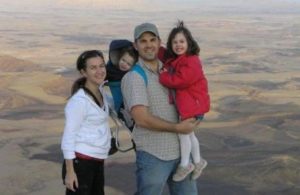Josh D.
Biliary Atresia
Author: Keida Kostreci
Originally published in VOA News.com
 Josh Dwonch was diagnosed with a rare liver disease when he was a baby. His parents, humanitarian workers, had faced their fair share of challenges, but nothing and no one could have prepared them for the fight of their life: saving their child.
Josh Dwonch was diagnosed with a rare liver disease when he was a baby. His parents, humanitarian workers, had faced their fair share of challenges, but nothing and no one could have prepared them for the fight of their life: saving their child.
Josh Dwonch has just celebrated his third birthday. Like most three-year-olds, he’s full of energy. But for Josh and his parents, any step he takes is a gift.
“They told us that they had identified that he had biliary atresia,” said Josh’s father, Andy. “We were shocked and had a bit of a breakdown actually because we really had prepared ourselves to hear that that was not what they would find.”
The disease affects 1 in 10,000 newborns worldwide. Dr. Evan Nadler is a specialist at Children’s National Medical Center in Washington D.C. He says the disease damages the bile ducts.
“What happens over time is these bile ducts become obliterated or fibrotic and basically stop bile flow from the liver and then with more time, if left untreated the liver gets backed up, and eventually leads to liver failure without instituting some sort of therapy,” said Dr. Nadler.
Josh had surgery to attach the liver to the small intestine so the bile could drain. The procedure corrected the problem, at least temporarily.
“The doctors had prepared us that even though the Kasai procedure – which is the name of the surgery – functions, that there was still a fairly good chance that he would need a liver transplant in the future,” said Andy Dwonch.
After the procedure, the family returned to Jerusalem, where the Dwonchs were working for a humanitarian organization. Everything was fine until a few days before Christmas last year when they were enroute to the US.
“Josh got a mild fever on the plane,” said Josh’s father. “Frankly we did not make much of it.”
But it was the beginning of a roller coaster for the family.
After several hospital visits in Seattle, Josh was sent to Stanford University’s Children’s Hospital in California and was placed on a list for a liver transplant. At the same time, it turned out that Albana, his mother, was compatible and could be a living donor.
“I felt a sense of relief together with gratitude, ” said Albana Dwonch. “Of course at the same time I was a little bit scared and a little bit nervous because it was a very long surgery, and most of all I was worried that after all of this would finish, I would not be able to take care of my son and Andy would have to have two patients in the house instead of one”.
At the last minute, though, an outside donor was found.
The same day, after a 10-hour operation at Stanford, Josh had a new liver and a new lease on life.
“After surgery these children can live a totally normal life,” said Dr. Nadler.
Dr. Nadler says no one knows what triggers biliary atresia, although there are theories.
Susan Robinson is a Vice President for Programs at the American Liver Foundation. Her organization raises money for liver research and “as part of its fundraising, engages communities around the country in a number of special events that raise money to help educate, raise awareness around the country,” she said.
The Dwonchs learned about one of these activities, the Liver Life Walk in Seattle, and they organized a team and raised money for it.
“We both felt that there was nothing more meaningful for us than an action of support for all of those people that in a way or another suffer from different liver diseases,” said Andy Dwonch.
Andy says he is grateful for the liver that saved his son, but he says the family that lost a child, whose liver Josh now has, is in their hearts.
“And it’s important to also acknowledge the fact that another family suffered tremendously to pass that gift on to Joshie”.
When they see their son running, laughing and enjoying every day, they feel that, for them, every anxious moment paid off.
Thanks to Keida Kostreci of Voice of America for sharing this story with us.
Last Updated on April 20, 2020
Share this page





